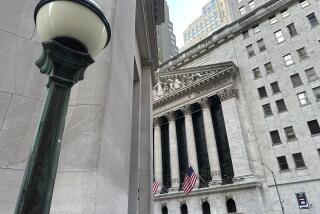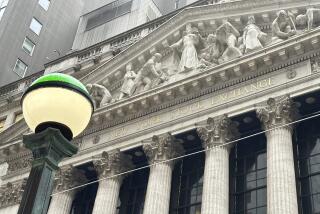As Rally Continues, Treasury Yields Rise
- Share via
The recent surge in Treasury yields picked up steam Tuesday as investors chasing a four-day stock rally on Wall Street fled the U.S. government bond market.
The yield on the benchmark 10-year Treasury note soared to 3.99% from Monday’s close of 3.80% -- its biggest one-day rise on a percentage basis since October 1998, when a Russian debt default triggered the near-collapse of Long-Term Capital Management, a prominent hedge fund.
On Oct. 9, the 10-year T-note was yielding 3.57%, the lowest level since the late 1950s.
The spike in yields will push up a range of interest rates, from consumer credit rates to corporate borrowing costs, and could bring an end to the tide of mortgage refinancing that has helped support consumer spending.
Coming as it has from historically low yields, the snapback was expected by many traders, especially as stocks fell to five-year lows and panicked investors were moving money into the perceived safety of fixed-income securities.
“This was coming. We had six weeks of an equity sell-off and we had bond markets being supercharged by equity weakness,” said Sadakichi Robbins, head of global fixed income at Bank Julius Baer.
Rising yields can depress the value of existing bonds, which often pay lower interest rates. Investors who need to sell their bonds before maturity -- or who own bonds through mutual funds -- can lose money during a period of rising interest rates.
It’s not clear whether the rise in yields has much further to run. Besides weak stock prices, a sour outlook for corporate earnings and tepid U.S. economic growth were pushing down yields as investors bet the Federal Reserve would trim interest rates again to spur growth.
But the outlook for corporate profits remains uncertain, despite some upbeat reports Tuesday. After the closing bell, Intel Corp., the world’s biggest chipmaker, said its third-quarter earnings missed Wall Street estimates and lowered its plans for capital expenditures. That sparked a sell-off in Intel shares in after-hours trading, as well as some late buying in Treasuries.
More to Read
Inside the business of entertainment
The Wide Shot brings you news, analysis and insights on everything from streaming wars to production — and what it all means for the future.
You may occasionally receive promotional content from the Los Angeles Times.










